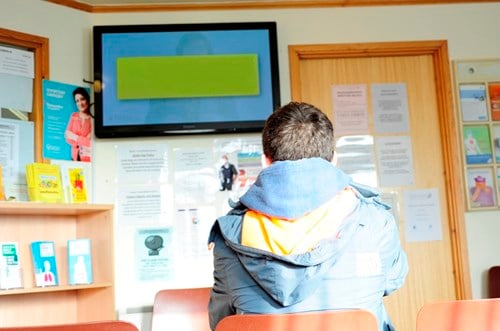Lack of deaf awareness in hospitals
Published Date: 15 Jun 2023
* Family not pictured. Stock photo from our image library.
Sitting in the children’s ward after a sleepless night and morning, I held my son as he went under general anaesthetic for the first time. Even though we were only at the MRI testing stage, my husband and I were both feeling a bit fragile.
A doctor came in afterwards and told me they were recommending cochlear implants and that surgery would be done as soon as possible. Trying to gather more information, I asked about alternative options if we didn’t want to choose cochlear implants. The response was crystal clear before it was even verbalised: the confused and questioning looks on faces of professionals who don’t look at implants as a choice but rather as a clear-cut fix that parents would be crazy not to jump at.
We asked questions of all the professionals and spoke to Deaf adults who have lived experience as well as families of children who had gone through this before us. We read studies and books, and went back and forth in our minds about what was best for our son. It was a painstaking process.
We firmly believe that Benji is not in need of fixing, but cochlear implants are very much presented to patients as a fix, which really threw us. On one hand, we knew we wanted every opportunity to support our child and remove the language barrier by helping him to speak English alongside having British Sign Language (BSL). On the other hand, we didn’t want to put him through risky surgery that might offer him nothing but headaches and exhaustion, not to mention potential alienation from the Deaf community.
When I was told the implants would mean we no longer needed sign language, I sat in stunned silence, unable to understand how they thought a language and a device to access sound could really be comparable. Why is it an either/or with implants and BSL, why not both? This attitude was a significant hindrance to us in our decision making and was a real eye opener to some of the ways that health professionals, even those working with deaf people, aren’t always deaf friendly.
When we decided to go ahead with cochlear implants, we found ourselves back in the hospital for his surgery. It was a hard time for us as parents, cautiously hopeful for the future but anxious about the surgery itself. It was undoubtedly a much harder experience for our son. None of the staff we met could sign with him, and there was a lack of deaf awareness in general. Being told our wee boy had woken after surgery and asked for me, but no-one understood him because he was signing, broke my heart. Realising that no-one could reassure him that we were waiting for him on the ward or comfort him was a gut-wrenching shock. While the staff were mostly lovely, and I appreciate that they’re incredibly busy and under-resourced, them not knowing how to interact with him was hard. I imagine this causes problems for many families like ours.
I would love to see some deaf awareness and basic BSL training for hospitals, particularly ones where they’re working with deaf patients, as I think it is really important! I know it would have made all the difference for my son, and for our family, throughout this process.
